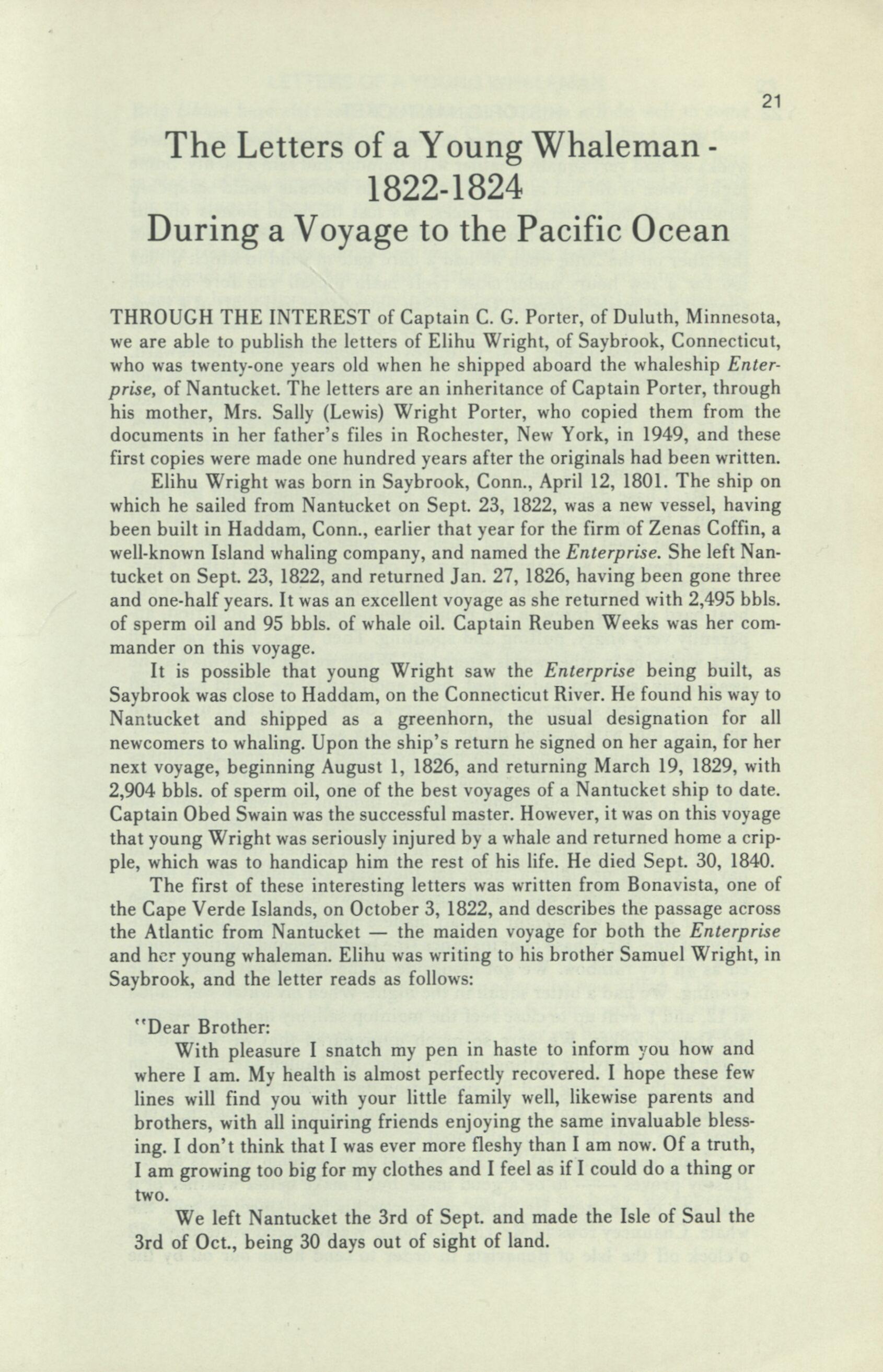
20 minute read
The Letters of a Young Whaleman — 1822-1824
T h e L e t t e rs o f a Y o u n g W h a le m an 1822-1824
D u r i n g a V o y ag e t o t h e P a c i f i c O c e an
THROUGH THE INTEREST of Captain C. G. Porter, of Duluth, Minnesota, we are able to publish the letters of Elihu Wright, of Saybrook, Connecticut, who was twenty-one years old when he shipped aboard the whaleship Enterprise, of Nantucket. The letters are an inheritance of Captain Porter, through his mother, Mrs. Sally (Lewis) Wright Porter, who copied them from the documents in her father's files in Rochester, New York, in 1949, and these first copies were made one hundred years after the originals had been written.
Elihu Wright was born in Saybrook, Conn., April 12, 1801. The ship on which he sailed from Nantucket on Sept. 23, 1822, was a new vessel, having been built in Haddam, Conn., earlier that year for the firm of Zenas Coffin, a well-known Island whaling company, and named the Enterprise. She left Nantucket on Sept. 23, 1822, and returned Jan. 27, 1826, having been gone three and one-half years. It was an excellent voyage as she returned with 2,495 bbls. of sperm oil and 95 bbls. of whale oil. Captain Reuben Weeks was her commander on this voyage.
It is possible that young Wright saw the Enterprise being built, as Saybrook was close to Haddam, on the Connecticut River. He found his way to Nantucket and shipped as a greenhorn, the usual designation for all newcomers to whaling. Upon the ship's return he signed on her again, for her next voyage, beginning August 1, 1826, and returning March 19, 1829, with 2,904 bbls. of sperm oil, one of the best voyages of a Nantucket ship to date. Captain Obed Swain was the successful master. However, it was on this voyage that young Wright was seriously injured by a whale and returned home a cripple, which was to handicap him the rest of his life. He died Sept. 30, 1840.
The first of these interesting letters was written from Bonavista, one of the Cape Verde Islands, on October 3, 1822, and describes the passage across the Atlantic from Nantucket — the maiden voyage for both the Enterprise and her young whaleman. Elihu was writing to his brother Samuel Wright, in Saybrook, and the letter reads as follows:
"Dear Brother:
With pleasure I snatch my pen in haste to inform you how and where I am. My health is almost perfectly recovered. I hope these few lines will find you with your little family well, likewise parents and brothers, with all inquiring friends enjoying the same invaluable blessing. I don't think that I was ever more fleshy than I am now. Of a truth, I am growing too big for my clothes and I feel as if I could do a thing or two.
We left Nantucket the 3rd of Sept. and made the Isle of Saul the 3rd of Oct., being 30 days out of sight of land.
HISTORIC NANTUCKET
We had very rough passage the most of the way. For two or three weeks we had very squally weather with thunder and rain a plenty. Some nights when it did not rain hard enough Old Boreaus would scrape up handfulls of salt water in our faces. We lost the head boards off our gallant ship's head that bore her noble name, one the 5th day out and the other on the 20th, when we had a hard gale of wind in which we lay too for a few hours under close reeft main topsail and fore topsail, staysail and mizzed-staysail. On the 9th day out we had a bit of a gam, as we sailed in company with the Independence.
About three o'clock, P.M. we discovered some whale to the leeward. We soon discovered them and ran down for them, lowered the first and 2nd Mates' boats. I was in the first Mate's boat in the midship oar. There was a bad sea running but we pulled over ditch and dam after some single whale but they went off faster than we could row our boat so both boats come to a stand and way at our oars.
Mr. Chase discovered a school of small whale and pulled for them and in a few minutes was fast to one. We were rowing the other way but tacked and stood for them and found they were cows and calves, and to be sure they were more thicker than the cows and calves in father's barnyard. Mr. Hussey thought best to both tackle one whale so we ran our boat hard on and threw in two irons when he came at us nose first, apparently very angry, puffing and spouting. Then it was back water, all back water, or in other words 'stern all.' When we got out of his way he swam away fast, and had we had 'bells and brandy' we would have had quite a romantic sleighride. When he grew dull we would haul up to him and spur him with a lance till he was bloody as a butcher.
Once, while hauling up to him, he raised his unmannerly flukes within a handsbreadth of our boat, to the height of 16 or 18 feet, in the air and it rained a noble shower, but we thought salt water would not hurt us, so we kept spurring him up until about dusk he died.
Had it been in the early part of the day our officers think we should have taken six or eight of them, for they kept squirming about like a basket of eels. There was one alongside that we took for more than an hour or so, that we thought we had made a mistake and struck two instead of one. Mr. Chase bent his lance (the first or second dart) as crooked as an Ivy rainbow. We got alongside of the ship about eight in the evening. We had a bitter squall in the night. When my watch was called at 12, and I went up to close reef the maintop sail, my hat got blew into old Davy's locker. We were so much unprepared that we worked all night to be ready for cutting in the whale. We hauled the blubber on board in the morning and the succeeding day tried it out, which made 32 barrels. If you want to know anything more about this whaling affair come here and I'll tell you all about it.
I am very sorry that Mr. Joy was not able to come with us as Mr. Hussey proves to be a good mate, but I make better weather of it than any of the crew. He chose me to row his boat since we took the whale. Chauncey rows in Mr. Chase's boat. We anchored yesterday at 2 o'clock off the Isle of Bonavista in order to send home our oil by the
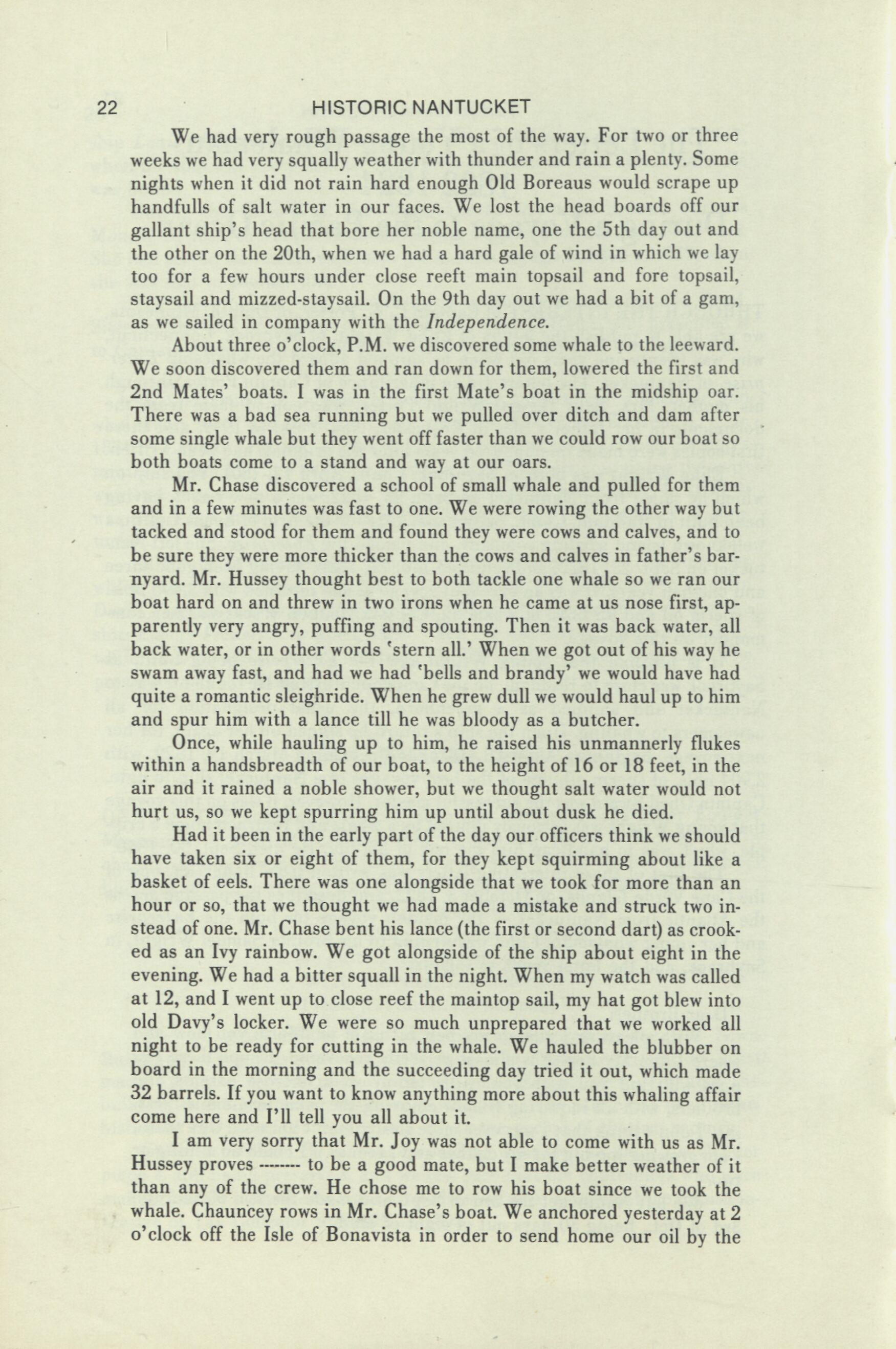
L E TT E R S O F A Y O UN G W HA L E MA N Brig Uhlan here after salt. If you can get time you will do well to come and get your salt before killing time. There is more in this island than you will want. All you will want is your 9 cents and bushel basket. There is plenty of fish along side of various kinds. I had some bread and milk for my dinner. The crew are generally pretty hearty some are afflicted with boils. I have not seen one sick hour until last night, after rowing ashore for six or eight miles and back, and then getting out our cables and bending and anchoring and furling sails. Being very hot, I had a severe headache which lasted through the night but I feel better today. We shall preceed in two or three days.
As time and paper have failed me quite I must now close my letter and wish you all goodbye. I shall write every opportunity and I will give you time to read one letter before you get another. I want to see Erasmus very much. You must make him some jacket and trowsers and send him to school so that he can go around Cape Horn when I get to be the Capt. of a whale ship. So fare you well. This from Brother E. Wright. Give my best compliments to all enquiring friends."
Written on back, Rec'd. 10th Dec. 1822.
Letter II.
South Pacific, Feb. 10,1823
On board ship Enterprise in Lat. 01°-40" South, Longitude 120° West.
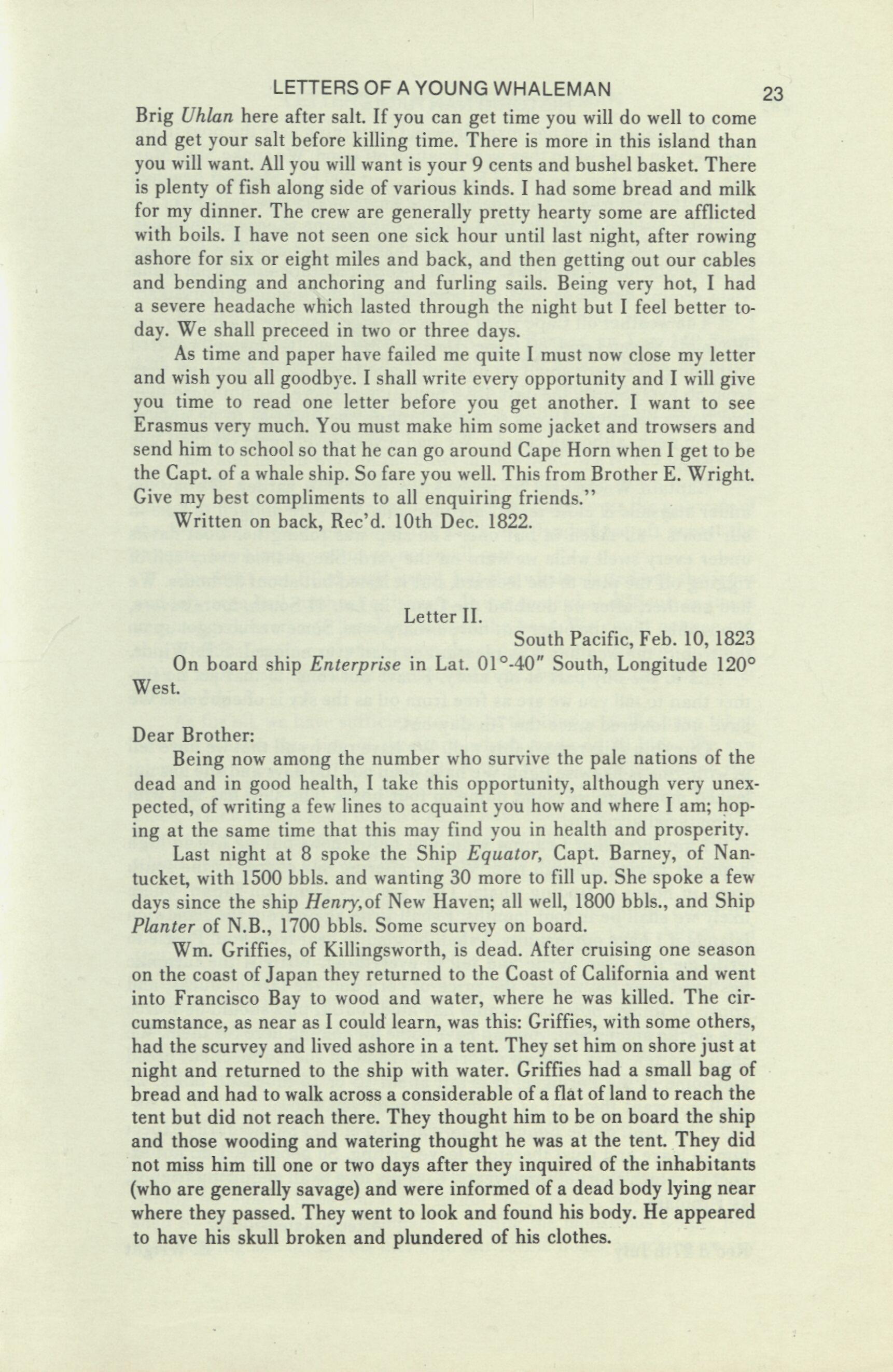
Dear Brother:
Being now among the number who survive the pale nations of the dead and in good health, I take this opportunity, although very unexpected, of writing a few lines to acquaint you how and where I am; hoping at the same time that this may find you in health and prosperity.
Last night at 8 spoke the Ship Equator, Capt. Barney, of Nantucket, with 1500 bbls. and wanting 30 more to fill up. She spoke a few days since the ship Henry, of New Haven; all well, 1800 bbls., and Ship Planter of N.B., 1700 bbls. Some scurvey on board.
Wm. Griffies, of Killingsworth, is dead. After cruising one season on the coast of Japan they returned to the Coast of California and went into Francisco Bay to wood and water, where he was killed. The circumstance, as near as I could learn, was this: Griffies, with some others, had the scurvey and lived ashore in a tent. They set him on shore just at night and returned to the ship with water. Griffies had a small bag of bread and had to walk across a considerable of a flat of land to reach the tent but did not reach there. They thought him to be on board the ship and those wooding and watering thought he was at the tent. They did not miss him till one or two days after they inquired of the inhabitants (who are generally savage) and were informed of a dead body lying near where they passed. They went to look and found his body. He appeared to have his skull broken and plundered of his clothes.
24 HISTORIC NANTUCKET
The Equator lost one man, drowned by turning over the boat in the breakers on a bar when they were boating off wood. We spoke Ship Marcus, of Sag Harbor, the 3rd of Feb. 6 mo. but 200 bbl. She had one man killed - the first whale. The whale struck the boat and threw a turn of the line over his head and dragged him forward to the chocks of the boat. He lived just six hours. Ship Alexander has lost two boys. The Plowboy, all well: 500 bbls. last news. We had pretty contrary wind from Bonavista around the Cape, very hot and calm on the line (at Nov. 1st).
The weather off Cape Horn was very rugged and the sea boisterous. We made Staten Land, off Cape Horn, the 8th Dec. Its tops well covered with snow. We were about 40 days off Cape Horn. 20 of which we were from 56 to 60 South, the days I8V2 hours long. There was not more than two hours darkness. It was so light through the night as to be able to read on deck, although cloudy. We had a very severe gale off the Cape the 19th.
Captain Weeks said he never knew it to blow harder. We lay too under staysails & close reefed maintopsails. We were obliged to take in our boats - all taken in but one. The ship was rolling her boat davits under every swell while we were on the yard. She washed every coil of rigging off the pins to the leeward, but it lasted but about 30 hours. We had another, after we doubled the Cape, in Lat. 41 South, more severe, if possible, than the other but not so sharp seas. Since we have got up on the tropic, the weather is as pleasant as man ever enjoyed. S.E. Winds.
As to the oily part of my story. I have not come to that yet no further than to tell you we are as free from oil as the sky is of cobwebs. We have not lowered since the 7th day out.
Our ship sails remarkably well. We have run by all that we have fell in with. She is likewise light. We have been out 100 days and she has not leaked more than we could pump in four hours. The ship has met with no material accident.
I am sorry that I cannot write you better news but we live in high hopes of having a sleigh ride. We are altering our course to the south some in hopes of finding whale. They are very plenty on Japan, where likely we shall be in four months. I shall write again from the Sandwich Islands if I have opportunity. I shall be glad to hear from you. Please to write me the news. Write and tell of everything. Write if the turnpike has lived over the winter; the price of corn and the fare of ducks; and above all things, how your swamp hay holds out. If pigs should be scarce this spring among you, you can have some for coming here for them. We shall in a few days have an assortment, some of the Connecticut breed and some of the Portugee. It is but about 15 or 16 thousand miles; we shall not want them all as we have no milk you know.
The Capt. of the Equator is now aboard of us. I momentarily expect him to leave and must therefore leave writing. So goodbye. I do not expect to return short of three years. Give my love to all enquiring friends, as I remain,
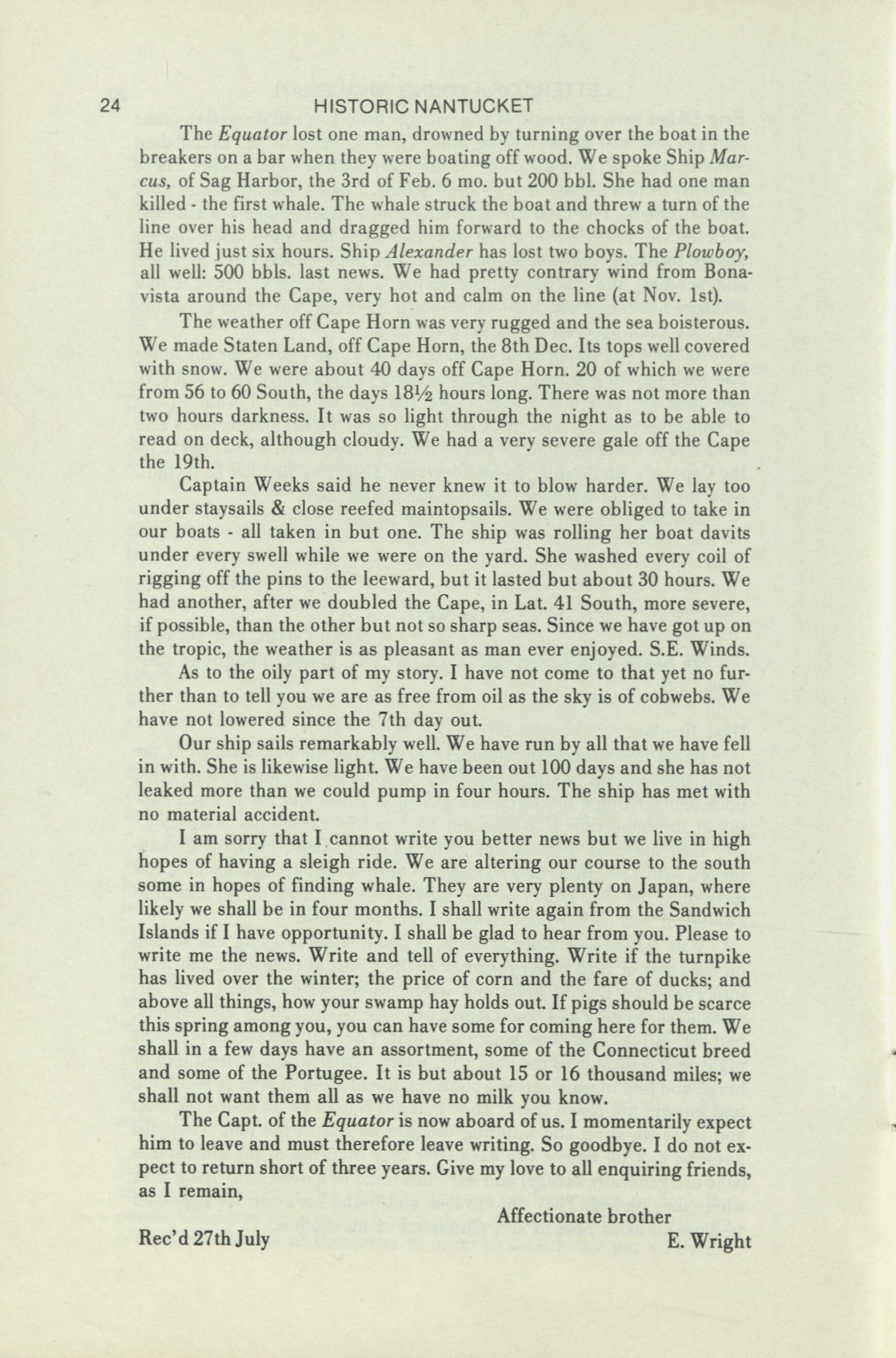
Affectionate brother
Rec'd 27th July E.Wright
LETTERS OF A YOUNG WHALEMAN
Letter III. 25
Beloved Brother:
I shall now improve time by writing a few lines to give you the news if you will take the trouble to peruse ( ) which may inform you that I am well, and have enjoyed my health two months past much better than I did the first part of the voyage. We are now lying at Oahu, one of the Sandwich Islands where we anchored the 12th of March.
We fell in with the ship Eagle on the 16th of Feb., six days after I wrote you last by the ship Equator, Capt. Barney, in Lat. 140 South 120 W. Long. Found all well on board — 900 bbls. Job has been frequently on board and on the 17th we were in a shoal of whale with the Eagle's crew. Stannard looks as tough as a white oak. As for my part, I got dry jokes and wet hatchet.
Jno. and myself were in the chief mate's boat. We rowed to leeward and struck a large whale. She up flukes and let have & we found the boat traveling upwards. She then reached her flukes over the gunwale of the boat and struck me across the back and landed me aft acrost the thwarts, bruising my shins to no small rate.
Our boat was filled with water, but the whale slatted out the irons and left us to bail our boat at leisure. It was somewhat difficult as it was very rugged, every sea breaking across the boat. We could not see our ship's loftiest spare except when on the top of a swell, although no more than a mile distant. This is the second time, but I calculate for better luck in Japan. As for oil, we have sufficient to use. in the binnacle. We have taken but two whales this side of the Cape which made us 30 bbls. We saw plenty of whalfe in 185° West, Lat. 8° North, but the weather was so rugged that we could not save the whale. We directed our course for this place, which I hope soon to leave as we have been here almost a month. Been ashore almost every day. We have got plenty of sweet potatoes, which cost $2 per barrel. Plenty of cabbage and some other kinds of garden sauce.
Benjamin Prosseter, of Killingsworth, is in here in the Phoenix • 1,000 bbls. Roderic Strong is here in the Alexander 1700. Alfred and Hillias Pratt are in here in the Plowboy 1200. As for our crew, four left us since we have been here. Two they have brought on board in irons, the other two they will not trouble. The cook is now on shore in the stockade and we are waiting for the Kanackas to bring him down. The one that stops here is from Haddam, by the name of Hubbard.
Jno. and Chauncey will not write because we have so little oil, but we have the more sleighrides, that's all.
Them pigs that I wrote you about, if you don't come for them soon will be roasted. I think it is time your cattle were turned out to grass. If you go fishing for shad I hope you'll not forget your errand. But taking a few shad by the neck will not compare to killing the monstrous whale, notwithstanding she often cuts dirt with our feeble boats, knocking us sky
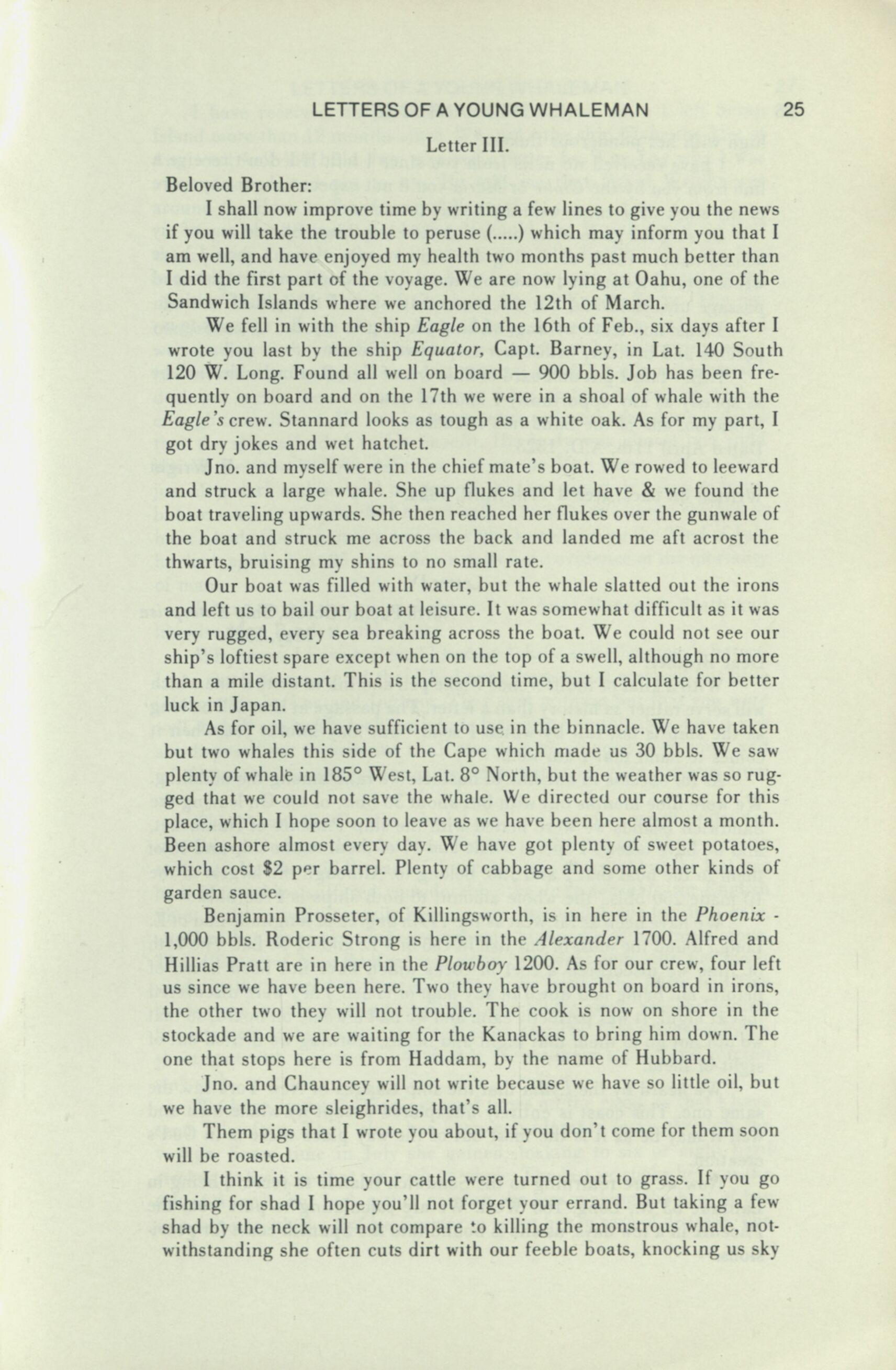
26 HISTORIC NANTUCKET high with her ponderous flukes.
I have received no news from you since I left. If I don't receive a line from you by the Globe or Maria you'll not expect to hear any more of my slack till I come with my bodily presence.
Be so good as to write me a little of everything. Should any of my acquaintances think of writing don't discourage them. I should have wrote several letters had I time but the ship is not full and the chance of passage uncertain and but a few moments since I thought of writing.
I must now leave writing, wishing you to give my due respects to my parents and brother, with other respective friends.
N.B. - This I put on board of Ship Iris of New Bedford which will be as speedy as any opportunity I know of now. Worahoo, one of the Sandwich Islands. Dated April 11th, A.D. 1823
E. Wright
Written on back, Rec'd 17th April, 1824.
Letter IV
North Pacific Ocean, Ship Enterprise May, 1823.
Dear Brother:
With a kind of indifference I take pen and ink to write a line which will serve rather as history than a letter. The passage at best will be long as the ship is not full by which I send - but may inform you when it comes to hand that I am well. As for success in our line of business we rank among the middling. We were nine months out with but about 30 bbls. of oil. On leaving the Sandwich Islands we were mated with the ship Phoenix of Nantucket, and we have taken 31 sperm whale and 17 of them to our ship and 10 of them to the boat that I and Jno. belong to. Although the largest of the 10 made 250 bbls., the whole amount to both ships is 1700 bbls.
We have been as far west as the 149th degree of longitude and of E. Long., found the most of our fish in 153 or 4 E. and 32 N. Lat. The 11th of June we discovered a reef of rocks which have not been heard of before, not being laid down in any map or chart. They were discovered just at night. It was perfectly calm and we had a whale on board, so that we did not go to them that night and before morning we drifted out of sight of them.
We heard by the Lydia that the ship Ganges of New York saw the same one. This coast is entirely unexplored except by whale men and well it may be as it is the most out of the way place there is in God's creation.
Now we are returning to the Sandwich Islands to recruit, being in Latitude 33 N., Long. 160 West. We are calculating to part from the Phoenix in a few days, as she is bound into the Spanish coast for provisions.
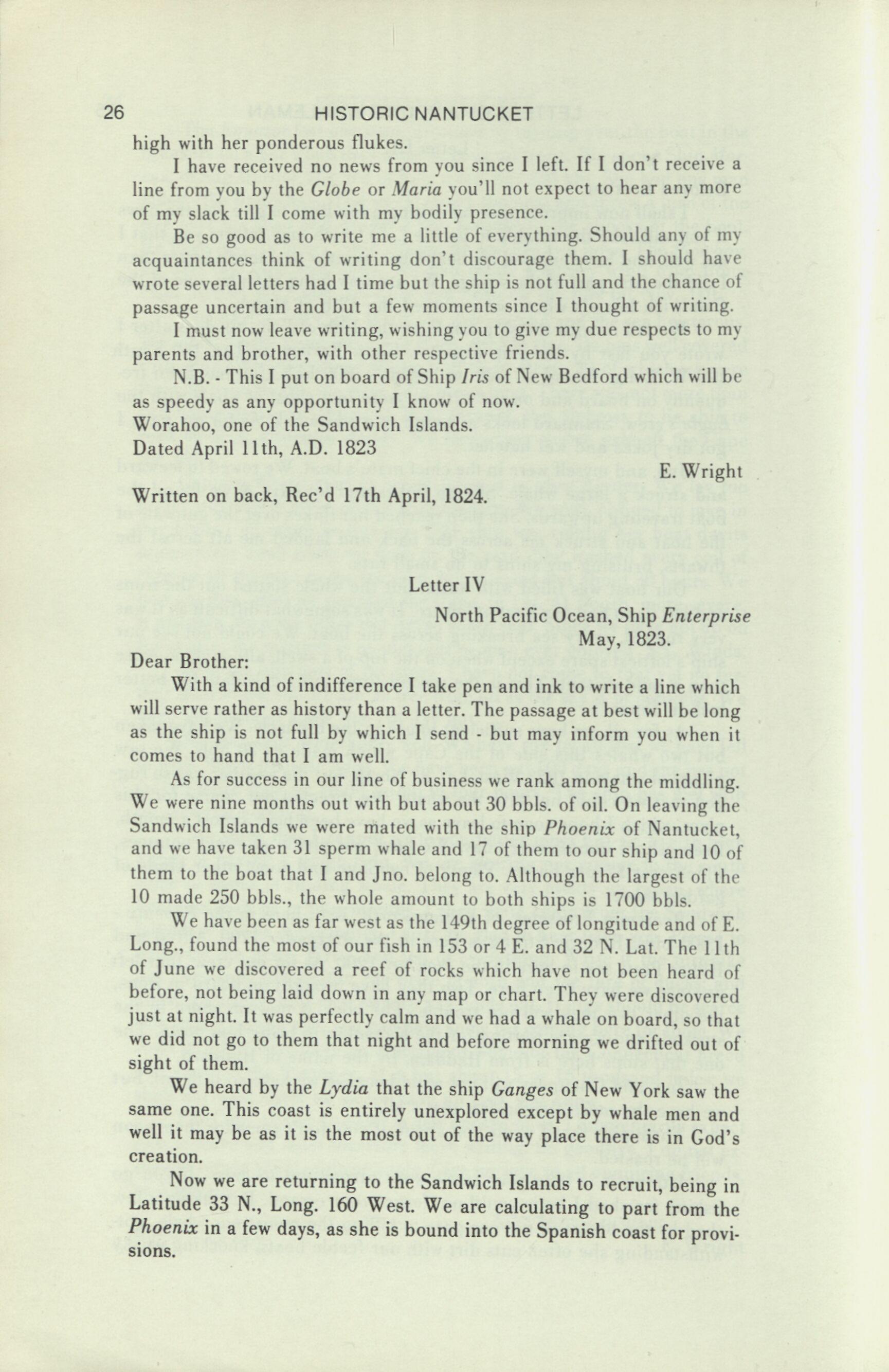
I have received no particular news from you since I left Scrap Island more than 12 months since. We spoke the ship Globe the 31st of Aug. - all well 450 bbls. Jno. received a letter by Wm. Lay who I was much disappointed not to see. He told me that David Wright was around the Horn in the Atavia of Nantucket.
As to the business of whaling I should like it well could we find them plenty enough - the voyages are generally healthy our crew has been highly favored, although we have lost one man by accident by the name of Daniel C. Reeve of Chatham, son of Enoch Reeve. The circumstance as follows: On the 14th of July we had whale on board and were boiling in the morning just before daylight, as he was turning some raw oil into the dry pots he made a misstep and fell backwards into the deck pot which then contained about three or four barrels of oil hot enough to melt lead. He was instantly taken out and everything applied that the ship afforded to his benefit. His body was almost one solid blister. He soon became delirious and on the 19th came slyly on deck just after dark and jumped overboard, the ship going six knots an hour, but we saw him and reached him closely. The sudden change seemed to have a bad effect upon him and made him worse and on the 22nd of July he died, aged about 25 years. So we daily have evidence of the mortality of man.
I have heard the melancholy news of Aunt Hannah's death and likewise Mrs. Burdett and others.
What news I have received I had by John's and Chauncey's letters. I was much disappointed that I had none from you. I received but little information by Lay and Ingham. They said nothing but that you were well. I shall anxiously look for letters by every late sail ship, but if you are disposed not to write me at all please to be so good as to come and tell me and so not expect any more waste paper for shoe patterns from me.
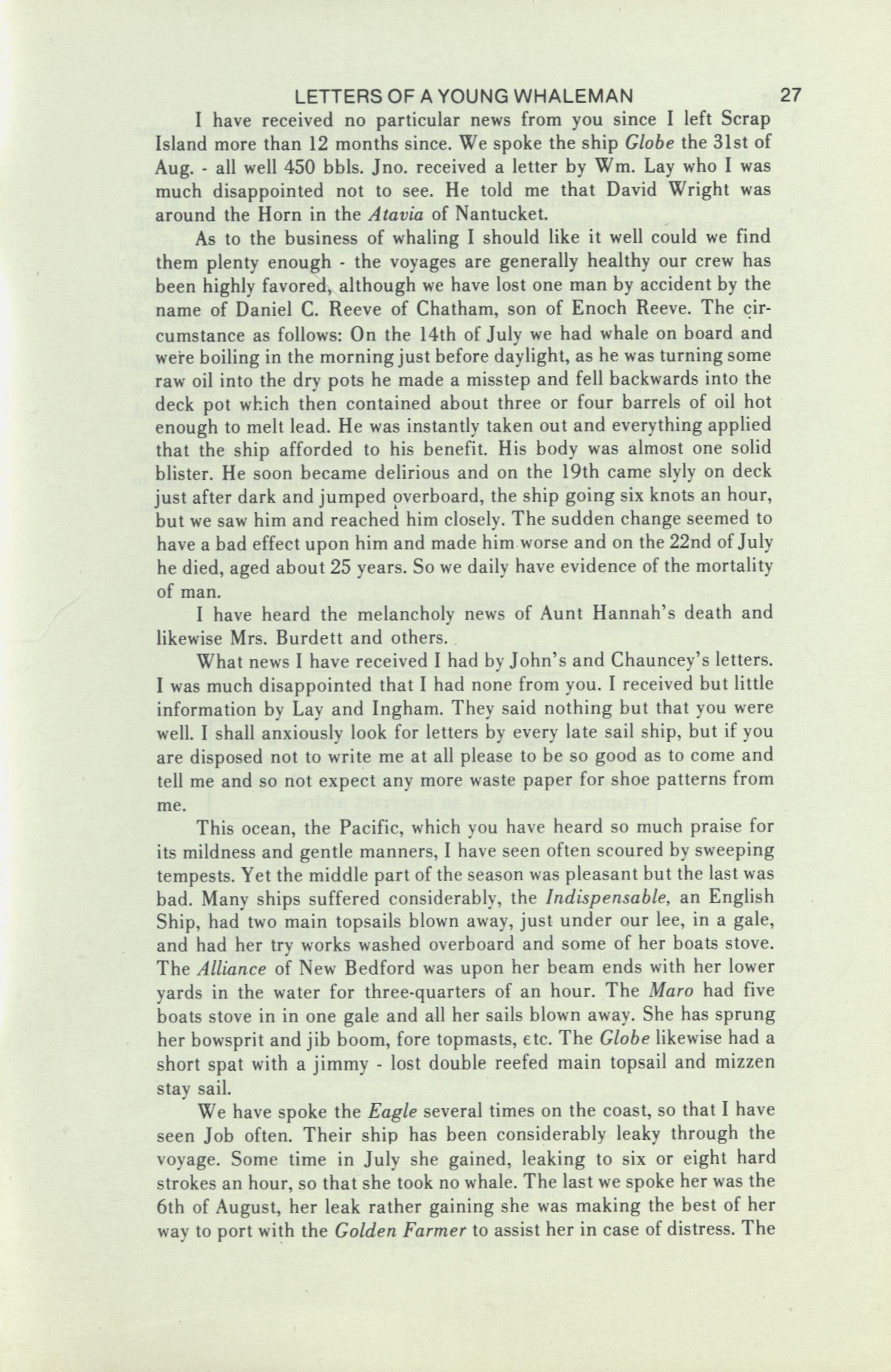
This ocean, the Pacific, which you have heard so much praise for its mildness and gentle manners, I have seen often scoured by sweeping tempests. Yet the middle part of the season was pleasant but the last was bad. Many ships suffered considerably, the Indispensable, an English Ship, had two main topsails blown away, just under our lee, in a gale, and had her try works washed overboard and some of her boats stove. The Alliance of New Bedford was upon her beam ends with her lower yards in the water for three-quarters of an hour. The Maro had five boats stove in in one gale and all her sails blown away. She has sprung her bowsprit and jib boom, fore topmasts, etc. The Globe likewise had a short spat with a jimmy - lost double reefed main topsail and mizzen stay sail.
We have spoke the Eagle several times on the coast, so that I have seen Job often. Their ship has been considerably leaky through the voyage. Some time in July she gained, leaking to six or eight hard strokes an hour, so that she took no whale. The last we spoke her was the 6th of August, her leak rather gaining she was making the best of her way to port with the Golden Farmer to assist her in case of distress. The










